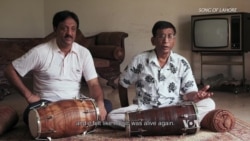Among the nearly 100 feature-length films screening at this year’s Tribeca Film Festival in New York City are more than 20 documentaries and features with an international focus, from a film about a Congolese businessman in China, to documentaries from Pakistan and the U.S., to a poetic look at disaffected South African youth, to a drama about a transgender tradition in the Balkans.
Based on a novel by Albanian-born writer Elvira Dones, Sworn Virgin tells the story of Hana, a young woman in 1980s Albania who is revisiting her decision to live as a man, a traditional option in parts of the Balkans where women have few rights.
Sworn virgins are allowed to dress as men, to take male names, own property, and socialize with men in settings where women are forbidden, but they must first vow lifelong celibacy.
Played by Alba Rohrwacher, Hana, or Mark, as she is known in her male persona, travels to Italy to visit her married sister, and begins to reclaim her identity as a woman and sexual being.
“The relationship between femininity and freedom is for me the film’s red line,” said director Laura Bispuri, who was awarded the Tribeca festival’s Nora Ephron prize for a woman filmmaker for Sworn Virgin.
A documentary from Pakistan, Song of Lahore charts a revival of the classical Pakistani music suppressed under Islamist Sharia law by former Pakistani dictator Zia Al-Haq in the late 1970s. Over the last decade, about 20 Lahore musicians have reclaimed their art through the Sachal Studio Orchestra, playing traditional Pakistani music of sitars, flutes, tabla drums and violins, and melding it with Western jazz.
The film, directed by Andy Schocken and Oscar winner Sharmeen Obaid-Chinoy, follows as Sachal musicians perform with Wynton Marsalis and the Jazz at Lincoln Center Orchestra, an invitation that came after their arrangement of the Dave Brubeck classic, Take Five, became an Internet hit. Several of the musicians also traveled to New York for the film’s premiere, and a post-screening performance of what reviewers have called their “joyous” music.
From the U.S., a documentary by Lyric R. Cabral and David Felix Sutcliffe, (T)error - the optional “T” provides an alternate title - follows a paid FBI informant, Saeed Torres.
A convert to Islam and former Black Panther, Torres agrees to be filmed for the documentary, keeping it a secret from his FBI handlers, even as he is tasked with befriending another American Muslim whom the FBI suspects is a terrorist in the making.
The result is a highly disturbing inside look at U.S. counter-terrorism law enforcement.
Indian filmmaker Hemal Trivedi says that a friend’s death in the 2008 Mumbai terrorist attacks led her to seek to understand the roots of Pakistan-bred militant Islam.
For Among the Believers, she and Pakistani co-director Mohammed Ali Naqvi spent years following radical cleric Maulana Aziz, a supporter of the Islamic State group, also known as ISIS, and the Taliban who agitates for harsh Islamic law in Pakistan.
The film also follows two 12-year-olds who both attended madrassahs run by Aziz’s Red Mosque network, and whose fates radically diverge, and activist and nuclear physicist Pervez Hoodboy, who leads moderates in a campaign against Aziz and all that he represents.
Stranded in Canton, a mostly improvised “documentary drama” by Swedish director Måns Månsson, working with Chinese filmmaker Li Hongqi, explores the human ties arising from China and Africa’s booming trade. It tells the fictional story of Lebrun, a Congolese entrepreneur who goes to China to arrange a shipment of t-shirts bearing slogans relating to the upcoming presidential election in Congo.
But the shipment is held up, and post-election, the T-shirts are valueless. Lebrun schemes to find a way to redesign the shirts for the next election, while spending his nights singing karaoke and falling in love with a Cameroonian businesswoman.
Månsson’s notes on the film say that all four principal cast members play themselves or “a version” of themselves. Lebrun, for example, a longtime friend of the director’s from Kinshasa, not only played the entrepreneur, Månsson says, but his spare time sought business deals in Canton, and actually did fall for the Cameroonian business woman in real life.
And Necktie Youth, a moody, melancholy feature from South Africa, sketches the lives of wealthy, disaffected teens, both black and white, in post-apartheid Johannesburg. It’s an Africa few Westerners know, says 23-year-old director Sibs Shongwe-La Mer.
“In terms of audiences abroad, for me it would be one of the films that kind of helps de-stigmatize the idea of Africa as being this Third World-kind of completely impoverished place,” he said in a press clip.
But Necktie Youth hardly makes its privileged young South Africans enviable, despite the film’s elegant black-and-white cinematography.
In his review, Hollywood Reporter critic Jordan Mintzer found “something almost science-fiction-like about Shongwe-La Mer’s approach to his own generation, as if he had descended from another planet and discovered a country transformed from a land of post-apartheid dreams into a drug-infused dystopia.”





